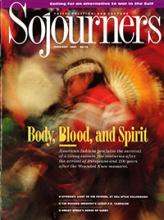He is, as he describes it, of mixed blood:
"Osage is my tribe of enrollment on my father's side; my mother was a Lutheran." These days both lines of his heritage interact to define just who he is.
In the mid-1970s, Tinker spent several years in Berkeley, California, first studying for ordination at Pacific Lutheran Seminary and then for a doctorate in Bible at Graduate Theological Union. While in the Bay area, which has the largest concentration of American Indians in the United States, Tinker organized a ministry to work as an agent of healing with Native American people in San Francisco, Oakland, and San Jose.
Tinker believes that the church, which has historically been part of the oppressive authority over the Indian community, must participate in healing -- "self-healing" -- with Indian people. After years of organizing at the local level, Tinker made the difficult transition into the academic world by accepting a position at Iliff School of Theology in Denver teaching multicultural ministries. As associate pastor of Living Waters, a joint Episcopal-Lutheran parish, he brings together his faith and heritage into a common tapestry, and at Iliff he shares that vision with a new generation of pastors-to-be.
George Tinker was interviewed by Bob Hulteen at the Sojourners magazine office in Washington, DC, while he was in town to participate in planning an alternative response to the 500th anniversary of Columbus' arrival. He discusses the need to address historical inaccuracies in American mythology, the seductive allure of assimilation for Indian people, the appropriate response for the church in reconciliation, and the effects of New Age spirituality on Native Americans.
-- The Editors
Read the Full Article

